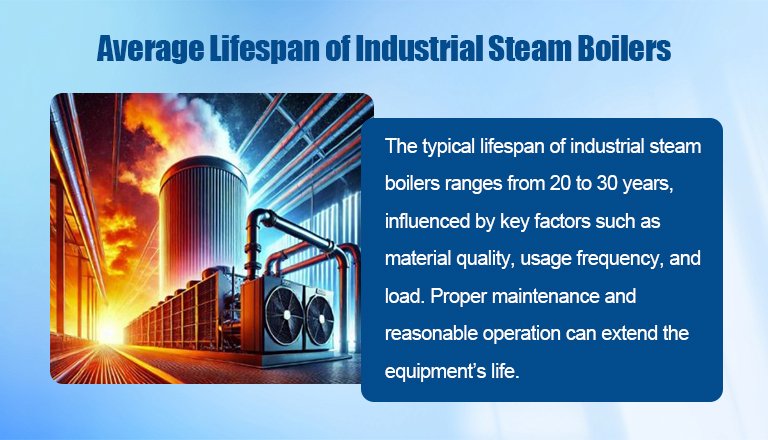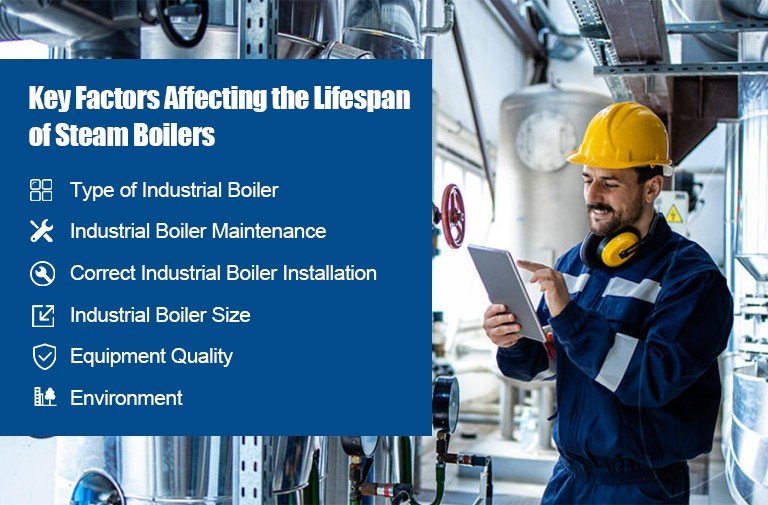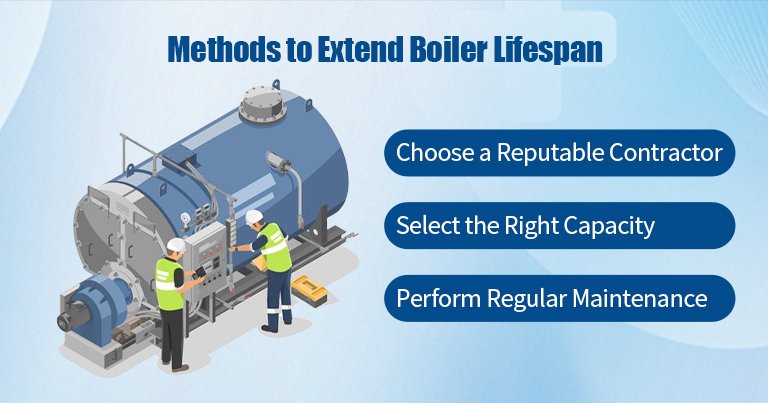In the field of industrial production, industrial steam boilers are like the “heart” of the operation, providing indispensable heat power for all kinds of production activities. However, for many industrial practitioners, a key question always lingers in the mind: how long does an industrial steam boiler actually last? Understanding its service life, not only helps companies to rationally plan equipment investment and maintenance costs, but also to protect the continuity and stability of production is an important prerequisite.
The Average Life Of Industrial Steam Boilers

Generally speaking, the average lifespan of an industrial boiler is about 15 years, but with careful maintenance, it can usually be used for 15 - 20 years. However, the actual lifespan of a boiler is not static and varies depending on the type and conditions of use.
Differences In The Life Expectancy Of Different Types Of Boilers
Gas Boilers: Gas boilers are widely used for heating and hot water supply in homes and commercial buildings due to their high efficiency and cleanliness. Under normal maintenance conditions, the lifespan of a gas boiler is about 10 - 15 years. Regular professional maintenance not only prolongs their service life, but also maintains good operating efficiency.
Steam Boilers: Steam boilers, as common heating and power equipment in industry and some large buildings, can last up to 30 years if they are maintained consistently and with high quality. This demonstrates the importance of good maintenance for steam boilers.
Modern Boilers: Modern boilers, represented by combi boilers and condensing boilers, benefit from technological advances and are designed to be more durable. With a life expectancy of 15 - 20 years, technological innovations have not only improved the thermal efficiency of boilers, but have also significantly extended their service life.
6 Key Factors Affecting the Lifespan of Industrial Boilers

The service life of an industrial boiler is influenced by a number of factors, 6 of which play a decisive role and deserve to be understood and emphasized by every industrial practitioner.
Installation Quality
The installation process of a boiler should not be underestimated. An incorrect or rushed installation can be the trigger for premature boiler failure. Unstandardized installation may lead to problems such as incorrect piping connections and improper commissioning of equipment, leaving the boiler in a non-normal operating condition from the very beginning. Therefore, it is important to strictly follow the manufacturer's installation guidelines and hire experienced and skilled professionals to operate the boiler during the installation process; only in this way can a solid foundation be laid for the boiler's long-term stable operation.
Regular Maintenance
Industrial boilers are like sophisticated large-scale machinery, regular inspection and maintenance is the key to prolong its service life. Some seemingly minor problems, such as minor piping leaks, component wear, if not dealt with in a timely manner, over time, it is likely to evolve into a serious failure, and even lead to boiler shutdown. Developing a scientific and reasonable routine maintenance program can identify and solve these potential problems in a timely manner, ensuring that the boiler always maintains efficient operation.
Operating Conditions
The operating environment of the boiler has a direct impact on its life. When the pressure or temperature during operation exceeds the manufacturer's specified criteria, the boiler system is subjected to additional loads and pressures. This overloaded operation will accelerate the wear and aging of equipment components and greatly shorten the service life of the boiler. Therefore, it is vital to strictly control the operating conditions to keep them within the specified limits.
Water Quality
The quality of boiler water is directly related to the durability of the equipment. The large amount of calcium and magnesium ions contained in hard water can easily form scale during the heating process, which adheres to the surfaces of internal piping and components of the boiler and reduces the heat transfer efficiency. Contaminants in the water, on the other hand, may trigger corrosion of metal parts. In order to solve these problems, the use of professional water treatment systems to purify and soften the boiler water can effectively prevent scaling and corrosion, and significantly improve the service life of the boiler.
Usage Patterns
The frequency and length of use of the boiler is also an important factor affecting its life. Continuous full-load operation will make the various components of the equipment for a long time in a high-intensity working condition, accelerating wear and tear; and repeated short-cycle operation will make the boiler frequently experience drastic changes in temperature and pressure, resulting in thermal shock, will also cause damage to the equipment. Therefore, rational planning of boiler use pattern, avoid excessive use and unreasonable operation, help to extend its service life.
Other Potential Factors
In addition to the above factors, the manufacturing quality of the boiler itself is also a potential factor affecting its service life. High-quality materials and superb manufacturing techniques can give boilers better performance and durability. In addition, the professionalism and standardization of operation of the operator will also affect the operating condition and service life of the boiler to a certain extent.
How To Tell If a Boiler Needs To Be Replaced
When an industrial steam boiler shows the following signs, it may mean it's time to consider replacing the unit
Reduced efficiency: If it is found that the boiler's fuel consumption has increased significantly without a corresponding increase in heat or steam production, this indicates a significant drop in the boiler's operating efficiency. At this point, replacing the boiler with a newer, more energy efficient model can effectively reduce long term energy costs.
Abnormal noise: Normal operation of the boiler will produce a certain sound, but if there is a loud banging, clanking and other abnormal noise, it may indicate that the boiler internal clogging, leakage or pressure abnormalities and other problems, need to be promptly investigated and considered for replacement.
Frequent repairs: When maintenance costs continue to be high, frequent repairs not only cost a lot of money, but may also affect the production schedule. In this case, buying a new boiler is more cost-effective and safer.
Corrosion and leaks: Signs of rust on the surface of the boiler, or the discovery of obvious leaks, are often the outward signs of a serious underlying problem. Regularly check your boiler for corrosion and leaks to avoid a catastrophic failure .
Practical Advice To Extend The Life Of Your Boiler

To extend the life of your industrial steam boiler, start with the following.
Choose a Reputable Contractor For Correct Installation
Incorrect installation can seriously affect the performance and life of the boiler, and even pose a safety hazard. Choosing an experienced and reputable contractor in the field of boiler installation can ensure that the boiler and related equipment are installed in a standardized manner and commissioned properly.
Choosing The Right Capacity Boiler
The capacity of the boiler determines its steam output and must be precisely matched to the actual demand for use. If the capacity is too small, long-term full-load operation will cause excessive pressure on the boiler; if the capacity is too large, it will increase the initial investment cost, and may also lead to short-cycle operation, accelerating equipment wear and tear.
Regular Maintenance
Having professionals maintain your boiler is key to ensuring its efficient operation. Regular maintenance not only reduces energy consumption, but also maximizes power output. Specifically, boiler maintenance can be carried out in the following ways:
Routine inspection: Establish a strict regular inspection system, at least once a month to carry out a comprehensive inspection, the inspection includes boiler pressure, temperature, water level, valve status and other key parameters, timely detection and correction of boiler efficiency problems.
Accident prevention: Regular maintenance can detect potential safety hazards in advance, such as tiny cracks in piping and loose parts. By addressing these issues in a timely manner, the likelihood of accidents can be minimized, preventing serious consequences such as injuries, structural damage to the facility, and production interruptions.
Compliance: Most jurisdictions have regulations that require industrial boilers to be inspected by a professional on a regular basis and maintenance records to be kept. Complying with these regulations, completing inspections, and fixing any problems found during inspections, is essential to ensuring that your organization is operating in compliance.
Reduced Costs: A well-maintained boiler operates more efficiently, not only reducing fuel consumption, but also lowering maintenance costs. By extending the service life of boilers and avoiding frequent replacement of equipment, it can save companies a lot of money in the long run.
In addition, the introduction of automatic cleaning systems, such as soot blowers that operate based on differential pressure, can automatically remove ash and impurities from the inside of the boiler; at the same time, the establishment of a perfect leak detection mechanism, timely detection and treatment of moisture leakage to prevent equipment rust and damage.
Common Problems And Solutions Of Industrial Boilers
Corrosion Problems
Oxygen in the water can lead to localized damage such as pitting corrosion in the metal parts of the boiler, while poor water circulation may trigger crevice corrosion. In response to these problems, the risk of corrosion can be effectively reduced by monitoring and controlling the pH value within the boiler system to keep it within a reasonable range, and by using chemical inhibitors to form a protective film on the metal surface.
Sludge Buildup
A build-up of debris and scale in the water can form sludge, blocking water flow paths and leading to boiler overheating and reduced efficiency. Regular power flushing to remove internal sludge buildup and the installation of a magnetic filter to attract ferromagnetic impurities in the water can effectively prevent sludge buildup problems.
Heat Exchanger Problems
The heat exchanger, as the core component of the boiler, once corrosion or sludge buildup occurs, problems such as leakage and clogging can occur, seriously affecting the efficiency of heat exchange. A professional cleaning and maintenance team can deep clean and overhaul the heat exchanger to ensure its normal and efficient operation.
Conclusion
The service life of industrial steam boilers is affected by a combination of factors such as installation quality, maintenance and operating conditions. Among them, the 6 key factors are to a large extent determines the length of the boiler's life. For industrial enterprises, a full understanding of these factors, pay attention to the installation, maintenance and rational use of the boiler, not only to extend the life of the equipment, reduce operating costs, but also to ensure the stability of production activities. Only by taking good care of this “heart” of industrial production can it continue to create value for the enterprise.
























